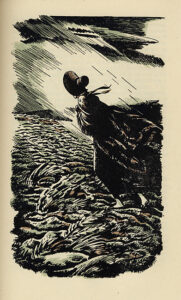Jane Eyre begins life as a ward of the wealthy Reed family, “a dependent … who ought to beg,” an orphan, one to whom no one owes affection. Mrs. Reed is her aunt but that means nothing. Mrs. Reed is one of several brutes who blight her childhood. We come upon Jane at 10 years of age, under siege from a malevolent cousin, John Reed, 14, a budding sociopath who “twisted the necks of … pigeons, killed the little peachicks, set the dogs at the sheep….” He bloodies her but does not cow her. She is blamed for being assaulted, one of a continual list of abuses she must endure. While she questions her plight, “why was I always suffering, always browbeaten, always accused, forever condemned,” she does not indulge in self-pity, but instead tells us that “the mood of the revolted slave was still bracing me with its bitter vigor.” Before she is exiled to the Lowood School, this slight girl of 10, confronts Mrs. Reed, and tells her “… you have no pity … you are bad; hard-hearted … you are deceitful.”
At the Lowood School, a place where indigent and unwanted girls are shipped to be taught how to become of use, she meets Mr. Brocklehurst, the overseer of Lowood, a miserly, sanctimonious creature who orders a girl’s hair to be cut because it is curled, who lectures ad nauseam on piety, who shorts his charges food and who bullies Jane in front of the entire school and declares her “a liar!” She is taught by Miss Scratcherd, the kind of teacher that a tiny bit of power turns into a two-bit sadist. At one point she binds a board around a girl’s neck, writes “slattern” on it and has her wear it all day. Her moral ugliness adds another layer of misery to Jane’s life.
For all her ability to endure neglect and punishment, she is saved by the kindness of others. I do not think saved is too strong a word. Jane is a remarkably strong child, but she is lonely and without allies she might have withered and broken or even died. She knows, even at 10, that “human beings must love something.” Notice the construction of that sentence. It is not that human beings must be loved but that they must love. This is an expression of will. In a conscious rejection of self-pity and bitterness, Jane will love in spite of the abuse she receives.
But even with her iron will, she might not have survived. Jane says, “I cannot bear to be solitary and hated.” It is the presence of kindness in others that temporarily relieves her of the struggles of her life. Into her life come those who show her affection and to whom she can return her versions of love: Bessie at Reed’s who tried to shield Jane from the worst and who told her “enchanting stories” and sang the “sweetest songs.” Jane genuinely loves Helen Burns, another orphan at Lowood. She was the first to give Jane comfort with a smile when she was utterly alone, standing on a stool, humiliated before the class. It is Helen who tells Jane “I read a sincere nature in your ardent eyes.” It is Helen who listens to Jane’s story with sympathy and without judgment. It is Helen’s sharp perceptions of Brocklehurst and of Jane’s position that show Jane a way out of her despair: “… Brocklehurst is little liked here ….” He is a man “[weak]” and “[pompous].” Helen calms and inspires her. Mrs. Temple, the school’s superintendent and a teacher, feeds Jane, clears her name and protects her.
Jane emerges from Lowood at 18, a respected teacher, her character shaped by privation but also by love. She learns to endure but she rejects the “doctrine of endurance.” She quests, she questions, she revolts, she chooses independence of mind and action. She knows that she “must resist those who punish [me] unjustly.”
The Reed family despised her, and she did not break. She was exiled to the harsh confines of Lowood, and she did not break. Helen died in her arms, and she did not break. However, friendless and unable to see a life outside of “servitude,” she applies for the position of governess, is accepted and by chance comes to Thornfield Hall and Mr. Rochester.
